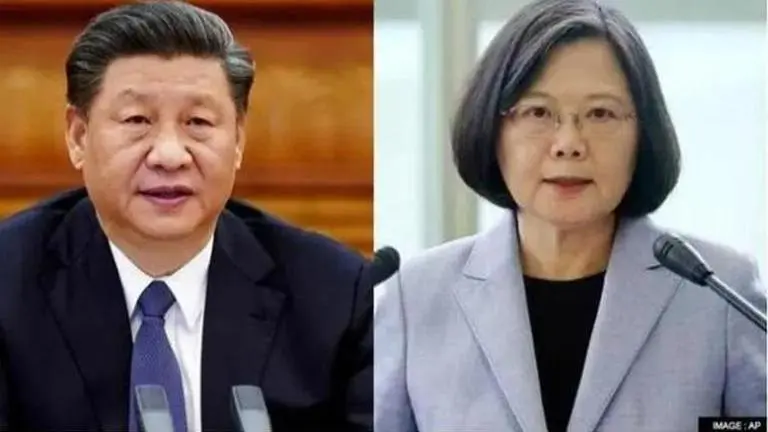Updated 31 October 2021 at 18:55 IST
China's PLA employs AI technology to simulate war games aiding Taiwan invasion: Reports
The report stated that PLA has examined nearly 350 artificial intelligence-related equipment deals between Chinese troops and state-owned defence entities.
- World News
- 4 min read

A significant report released by the Centre for Security and Emerging Technology (CSET) at Georgetown University stated that the People's Liberation Army (PLA) of China has been resorting to artificial intelligence (AI) technology to simulate war games for invasion operations directed toward Taiwan.
"Within the next five to 10 years, the PLA will likely continue investing in AI to disrupt U.S. military information systems and erode the U.S. advantage in undersea warfare," the report read.
China adopts AI technology to simulate war games for invasion against Taiwan
The aforementioned report is titled 'Harnessed Lightning How the Chinese Military is Adopting Artificial Intelligence' and it claims to have examined nearly 350 artificial intelligence-related equipment deals between Chinese troops and state-owned defence enterprises to adopt AI in the year 2020.
"The report identifies China’s key AI defence industry suppliers, highlights gaps in U.S. export control policies, and contextualizes the PLA’s AI investments within China’s broader strategy to compete militarily with the United States," a summary of the report formulated by Ryan Fedasiuk, Jennifer Melot and Ben Murphy read.
One of the CSET analysts, Ryan Fedasiuk, wrote in a Tweet, which is now deleted, "Specifically, we find the PLA is buying AI systems designed to identify undersea vehicles, wargame Taiwan operations, track US navy shops and deploy electronic countermeasures, among other tasks,"
Advertisement
'60% are private companies'
The report's executive summary further read, "But as tensions mount between the United States and China, and some experts warn of an impending crisis over Taiwan, it is crucial that the US policymakers and defence planners understand the commercial off-the-shelf (COTS) AI technologies already available to the Chinese military."
Quoting one of the researchers, Taiwan News reported, "We find that China's military-civil fusion development strategy is paying real dividends. Of the 273 AI equipment supplies in our data set, 60% are private companies. The overwhelming majority are quite small, established only in the last 10 years."
Advertisement
Key findings of China's AI-based invasion operations against Taiwan
As per the report, Chinese military leaders are already procuring AI-related systems and equipment to prepare for “intelligentized” warfare, but AI so far represents a small fraction of overall purchasing activity.
"While we can only estimate a floor for Chinese military AI spending, it is likely that the PLA spends more than $1.6 billion each year on AI-related systems and equipment," the report stated.
The report enumerated that China views AI as the key to transforming the PLA into a “world-class,” globally competitive military force. "PLA advances in AI and autonomy will create new vulnerabilities for the United States and allied forces operating in the Indo-Pacific," it added.
- The PLA hopes to use AI to generate asymmetric advantages vis-à-vis the United States, which it regards as a “strong enemy”, but also a role model for AI development.
"PLA units and military laboratories are focused on developing autonomous vehicles and surveillance systems in the undersea domain, where the United States has traditionally had a significant advantage," the report disclosed
Further, it read, "The PLA is stepping up investment in information operations and adaptive radar systems to jam and blind U.S. sensor and information networks, which PLA leaders judge to be particularly vulnerable."
China-Taiwan feud
Taiwan, officially the Republic of China (ROC), is an island that shares maritime borders with China (People's Republic of China, PRC). The political, social and international status of the island state continues to be contentious as a result of the Chinese Civil War and a subsequent split of China namely, ROC and PRC. The question persisted through decades whether Taiwan should remain a territory of ROC or merge with the mainland under the newly-formed PRC. The Taiwan issue subsists in the international organisational system and points out whether Taiwan's existence as a sovereign state as part of both ROC and PRC should be legitimised. Currently, the Taiwan identity row hinges on subjects and matters of international law as well.
In 1971, after the vote by a majority in the United Nations, PRC was recognised. However, ROC continued to claim itself as the legitimate representative of China compelling Taiwan to maintain unofficial and representational ties with states and institutions. While the island is claimed by the PRC, the Xi Jinping-led regime refuses to acknowledge and recognise Taiwan's independent diplomatic relations with foreign entities. Domestically, the major feud is between sides and political parties that either favour the Chinese unification notion as opposed to those aspiring a formal international recognition and legitimacy in a bid to attain Taiwanese identity.
Published By : Srishti Jha
Published On: 31 October 2021 at 18:55 IST
